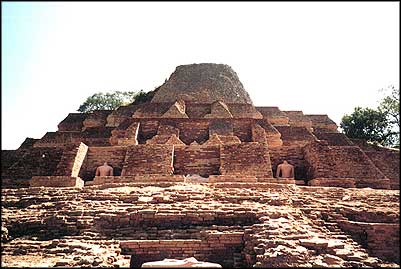|
 One
of the Buddha's most celebrated discourses is the Kalama
Sutta in which he advised that his teachings be accepted
only after careful scrutiny and reflection. For a translation
of the discourse get The Buddha's Charter of Free Inquiry:
Kalama Sutta, Wheel No 8. This
discourse was delivered to the Kalama people while the Buddha
was staying in their chief town, Kessaputta. One
of the Buddha's most celebrated discourses is the Kalama
Sutta in which he advised that his teachings be accepted
only after careful scrutiny and reflection. For a translation
of the discourse get The Buddha's Charter of Free Inquiry:
Kalama Sutta, Wheel No 8. This
discourse was delivered to the Kalama people while the Buddha
was staying in their chief town, Kessaputta.
According
to legend, in the last year of the Buddha's life when he
left Vesali on his way to Kusinara a large group of Vijjians
followed him and refused to leave him. When they finally
got to Kessaputta the Buddha urged the throng to return
to their homes and they reluctantly agreed. To console them
he gave them his begging bowl. Later, a stupa was built
on the site of this incident. The later history of the famous
bowl relic is to be found in Middle Land Middle Way. Both
Fa-hian and Hiuen Tsiang visited this stupa and left short
accounts of it. Today
Kessaputta is represented by the small town of Kesariya
about 55 kilometres north-west of Vesali. The stupa rises
in five huge terraces each of a different shape so that
from above it would look like a giant mandala. In each terrace
are niches enshrining life size statues of the Buddha.
The
stupa is still undergoing excavation and restoration. Cunningham
measured it and found it to be 1400 feet in  circumference
and 51 feet high and estimated that its dome would have
originally been about 70 feet high. Concerning his further
findings he wrote, "The excavations have disclosed the walls
of a small temple 10 feet square, and the head and shoulders
of a colossal figure of the Buddha, with the usual crisp
curly hair". To get to Kesariya from Vesali return to the
main Muzaffarpur - Motihari road and turn off at Pipra.
Don't take the Chakia road, it looks shorter but it is virtually
impassable. circumference
and 51 feet high and estimated that its dome would have
originally been about 70 feet high. Concerning his further
findings he wrote, "The excavations have disclosed the walls
of a small temple 10 feet square, and the head and shoulders
of a colossal figure of the Buddha, with the usual crisp
curly hair". To get to Kesariya from Vesali return to the
main Muzaffarpur - Motihari road and turn off at Pipra.
Don't take the Chakia road, it looks shorter but it is virtually
impassable.
|